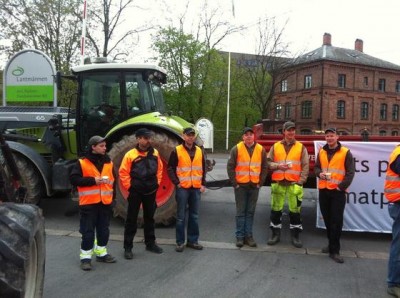Norway’s frustrated farmers believe they have the support of most Norwegians, but there are signs that unconditional support is waning. Calls are now rising for the farmers to demand a better deal from their distribution and marketing cooperatives like Tine, Gilde and Nortura, instead of just from the state.

Norwegians do indeed have a long tradition of hailing agriculture as a means of keeping outlying districts populated and boosting national self-sufficiency. Norwegian consumers have patiently paid high prices for food for decades, while also allowing their politicians to allocate large chunks of their tax money to those farming the land.
Some now believe, however, that the root of the current conflict over subsidies and food prices lies not as much with the farmers themselves or even with the much-bashed grocery retailers, as it does with the powerful agricultural cooperatives that control the market. Their role in determining the prices of various agriculture products should be reviewed and evaluated, they contend.
Olav E Klingenberg, a retired lawyer in Norway, is among those wondering why neither the farmers nor state officials examine the powerful role that the cooperatives and so-called “market regulators” like Tine, Gilde and Nortura (Prior) have in the dairy, meat and poultry markets. Klingenberg claims that while farmers get only NOK 5 from a liter of milk that costs NOK 15 in the stores, and the store itself gets around NOK 1-2, “the rest goes to distribution – for milk, to Tine,” which has a virtual monopoly on the dairy market.
“This is an area where competitors are tiny, like Synnøve Finden and Q-meieriene, and only barely are allowed to exist on the lowest shelf,” Klingenberg wrote in a letter to newspaper Aftenposten on Tuesday. It’s “entirely possible farmers deserve higher prices for their products,” he wrote, but he thinks they should re-evaluate their own distribution structure and the prices they get through Tine, Gilde and Nortura.
While Norway’s major farmers’ oganizations like Norges Bondelag and Norsk Bonde- og Småbrukarlag are quick to criticize government officials and launch protests, they’re not inclined to criticize the co-ops as market-makers. On the contrary, they’ve even tried to punish fledgling farmer-owned competitors to the cooperatives, like last winter when they boycotted a hotel that no longer served milk from Tine.
“If you raise questions about why most of what we pay for food disappears into a mammoth cooperative, we’re told that any changes would have greater consequences for life in rural districts than the plague,” Klingenberg wrote in his letter to Aftenposten.
He suggests that’s a “bluff,” and that the farmers who own Tine and Gilde and Nortura should demand that they operate with more economic advantages for the farmers themselves.
Embattled state officials, faced with a startling lack of gratitude for billions of kroner in subsidies over the years, may finally raise questions themselves, although Agriculture Minister Lars Peder Brekk also refused to publicly criticize or examine Tine’s role when the butter shortage hit last fall. Meanwhile, the farmers keep blaming the government instead of turning a critical eye on the structure of the very system that pays them. And thousands of consumers keep driving over the border to Sweden to buy cheaper groceries there instead.
Views and News from Norway/Nina Berglund
Please support our stories by clicking on the “Donate” button now:

